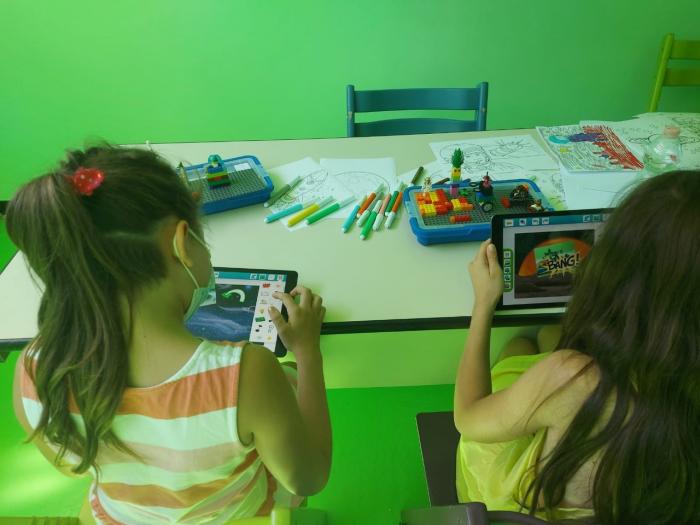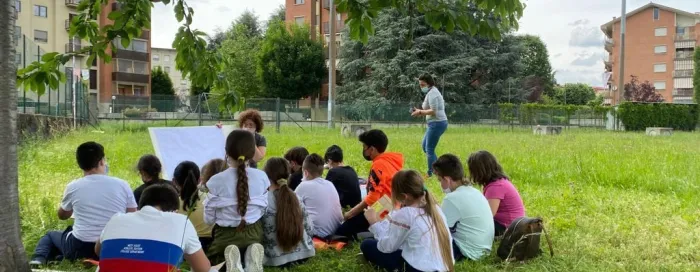This best practice is a contribution to our #ChildUnion campaign and part of our #ProgressiveLocalStories, aiming at raising awareness on the many positive initiatives implemented by progressive cities and regions in Europe. Cities and regions have become laboratories for innovative solutions and, with this series, we want to discover how progressive mayors, councillors and presidents of regions put in place policies to promote child-friendly cities and regions.
Since the beginning of our term of office, we have worked to make Settimo Torinese an increasingly child-friendly city, because a city that knows how to change the order of its priorities and is sensitive to the needs of children is and will be a better city for everyone. We have launched many projects in this sense, from the new centrality that it is essential to give to schools and education, to the rethinking of the town plan and, for example, to some new parks co-designed with children for urban development seen from the perspective of the youngest, to - of course - the many projects for social inclusion and help for families, which have unfortunately multiplied to cope with the effects of the pandemic.
The main actions that the Municipality of Settimo has already been implementing for some time to promote the inclusion of minors, with particular attention to the disadvantaged, are:
1. SOCIAL
- Via Foglizzo 10-12: a space in a working-class neighbourhood rescued from squatting by the underworld and turned into a workshop for robotics, storytelling and homework help, dedicated to local families. The idea is to promote educational activities in a space that has been neglected until now, to strengthen the social network starting with the families and, in collaboration with the social services and specialised educators, to redevelop a complex and long-neglected neighbourhood. One of the activities was set up in collaboration with the Lego Education workshop in Settimo Torinese.
- Autism centre (starting): a place dedicated to people up to the age of 20 who suffer from autism, with inclusive activities dedicated to them and others aimed at supporting families. The activities complement the school curriculum with educational elements specifically dedicated to people with autism.
- Progetto Caleidos: set up to combat educational poverty with various activities for parents and children in the 0-6 age bracket (workshop on emotions, yoga in schools, manual skills workshops, psychomotricity, etc.).
- Centro Educativo Minori welcomes families and children up to 14 years of age, especially foreigners, for literacy activities, cooking workshops, homework help, Italian language teaching (for adults).
- Free summer camp for nursery school children and for all families who have reduced their work due to the crisis triggered by the pandemic

2. SCHOOL
- The Passetti Project: an activity to combat school drop-outs for 4th and 5th graders and middle schoolers, with workshops and activities both during and outside school hours, with the involvement of families. The principle is to broaden the educational offer and to introduce new activities able to stimulate children, especially those most at risk, to attend school and thus to continue their education. The aim is to reverse the traditional school approach by promoting moments of dialogue to include children, especially the most problematic ones. The workshops are proposed by the Archimede Library, the world of voluntary work and others.
- Networking point: the creation of a network linking educational institutions. The aim is to share good practices in classroom teaching and to implement a shared collaboration on the organisation and management of problematic cases and critical issues that may arise.
3. LIBRARY/WORKSHOPS
- RobotTiamo project and "Children towards Stem": uses educational robotics as a tool to promote social inclusion and strengthen the parent-child relationship, in children in the 3-6 age range.
- Stem*Lab: a project launched at the Istituto Comprensivo Settimo III aimed at children aged between 5 and 14 to create an open school environment using innovative methodologies for STEM (Science Technology Engineering Mathematics) education as a lever for growth, overcoming educational poverty and informal learning (soft skills). These places are driven by a common goal: to enable children to discover their own abilities, to learn and experiment first-hand, to develop not only their skills but also their self-confidence. The LEIS Biblioteca Archimede participates in the scientific coordination of the project, bringing its experience with educational robotics, coding and storytelling using Lego Education kits and innovative educational technology tools.
- Psychological desk for students with DSA in Archimede Library: in addition to consultations with a psychologist, the project includes meetings with the educating community (parents, teachers and educators) aimed at learning about compensatory tools and teaching strategies for pupils with SLD. Workshops are also planned for the classes themselves, aimed at settling any conflicts that may arise in classes with pupils with SLD.
- Erickson and Anastasis demo point in the Archimede Library: here families can test free of charge software and hardware designed to help children with DSA (live-scribe pens, mouse scanners, dedicated software, etc.).
- Project “Books for all”: created to distribute books in the Library in Alternative Augmentative Communication, useful to facilitate the learning of children with communication difficulties (those with autism, but also those who do not speak Italian). Within the project, children's books are also translated into AAC symbols.
- Lion's Spoken Book: A project aimed at visually impaired and blind children with the dissemination of "Spoken Books" to allow children who cannot read to enjoy the benefits of reading.
- Special Educational Needs training: periodically, the Archimede Library organises training sessions for teachers aimed at conveying a correct teaching approach for children with BES.
- Inclusive workshops to raise children's awareness of disability issues (deaf and visually impaired): breakfast in the dark, LIS (sign language) workshop, read aloud also in LIS.
- Accessible library: creation of routes and signs in Alternative Augmentative Communication in the Archimede Library
- Tutti compresi project: involving children and adolescents in difficult family situations, with weekly activities to support library staff.
Photo credit header: Elena Piastra / Facebook.
